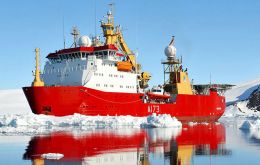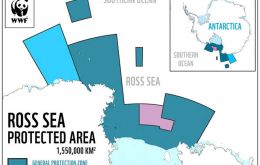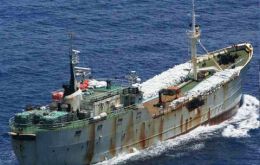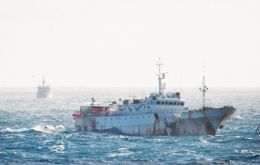MercoPress. South Atlantic News Agency
Tag: Conservation of Antarctic Marine Living Resources (CCAMLR)
-
Wednesday, June 2nd 2021 - 05:20 UTC
HMS Protector equipped with drones for polar extreme missions

Royal Navy’s Ice Patrol Ship HMS Protector has been assigned two small rotary-wing drones, specially adapted for her unique mission in the polar extremes. Although the Devonport-based survey ship has a large flight deck, with no hangar she cannot take helicopters with her – unlike her predecessor HMS Endurance, which carried two Lynx.
-
Saturday, December 2nd 2017 - 08:56 UTC
World's biggest marine reserve in Antarctica's Ross Sea comes into effect

The world's biggest marine reserve in Antarctica officially comes into effect on Friday, in what has been hailed as a “watershed” moment in conservation. The marine protected area in the Ross Sea curbs damaging activities such as fishing, to protect wildlife including Adelie and emperor penguins in the high seas off Antarctica.
-
Tuesday, April 28th 2015 - 05:38 UTC
Australia intercepts and boards the fishing vessel 'Perlon', from the IUU list

Australia has intercepted in the Southern Ocean the fishing vessel Perlon, believed to have been operating under a false flag in defiance of international conventions, according to an official report from the Ministry of Immigration and Border Protection.
-
Wednesday, January 14th 2015 - 07:19 UTC
New Zealand navy detects three toothfish poachers red-handed in the Ross Sea

The New Zealand navy has discovered a third boat fishing illegally. The Foreign Ministry informed that the HMNZS Wellington caught another vessel, “Yongding”, to the west of the Ross Sea, in Antarctic waters.
-
Saturday, November 1st 2014 - 04:22 UTC
Creation of Antarctica marine protected areas blocked by China and Russia

The Commission for the Conservation of Antarctic Marine Living Resources (CCAMLR) has again failed to agree to protect key areas in the Ross Sea and East Antarctica at its annual meeting in Hobart due to blocking by China and Russia. The partners of the Antarctic Ocean Alliance (AOA) said that this failure to reach consensus for the fourth time calls into question CCAMLR’s ability to deliver on its conservation commitments.
-
Monday, October 21st 2013 - 19:42 UTC
Fears that proposal for MPA in the Ross Sea will again succumb at CCAMLR

The world's biggest marine reserve in Antarctica may have to be given an expiry date to get countries with interests in the prized waters to agree to it. Delegations from 25 nations are resuming in Tasmania a New Zealand-US proposal for a marine protected area (MPA) in the fish-rich Ross Sea, 3500km south of New Zealand.
